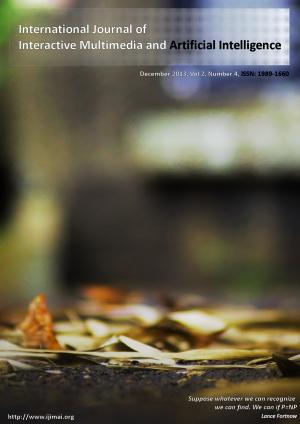- Year: 2013
- Vol: 2
- Number: 4
The research works presented in this issue are based on various topics of interest, among which are included: Mobile services, mpeg, agent-based Simulation, complexity, management accounting systems, animal-drawn vehicles, traffic and transport, possibility theory, precautionary saving, MAS, ambient intelligence, gamification, sustainable environments, disaster recovery, DSS, constraint programming and ICT.
López et al. presents the progress and final state of CAIN-21, an extensible and metadata driven multimedia adaptation in the MPEG-21 framework. CAIN-21 facilitates the integration of pluggable multimedia adaptation tools. To drive the adaptation, it uses the description tools and implied ontology established by MPEG-21. The paper not only describes the evolution and latest version of CAIN-21, but also identifies limitations and ambiguities in the description capabilities of MPEG-21.
Friederike Wall investigates the effectiveness of reducing errors in management accounting systems with respect to organizational performance. In particular, different basic design options of management accounting systems of how to improve the information base by measurements of actual values are analyzed in different organizational contexts. The results provide broad, but no universal support for conventional wisdom that lower inaccuracies of accounting information lead to more effective adaptation processes. Furthermore, results indicate that the effectiveness of improving the management accounting system subtly interferes with the complexity of the interactions within the organization and the coordination mode applied.
Sánchez-Aparicio et al. analyzes the structure of the data collected in the population dependent or receives its revenues in the use of animal-drawn vehicle, to extract an economic model for the development of this activity introducing formal parameters, as well as replacement of the vehicle analyzes the development of this activity in this population.
Ana María Lucia Casademunt and Irina Georgescu study the optimal saving problem in the framework of possibility theory. The notion of possibilistic precautionary saving is introduced as a measure of the way the presence of possibilistic risk (represented by a fuzzy number) influences a consumer in establishing the level of optimal saving. The notion of prudence of an agent in the face of possibilistic risk is defined and the equivalence between the prudence condition and a positive possibilistic precautionary saving is proved. Some relations between possibilistic risk aversion, prudence and possibilistic precautionary saving were established.
Celia Gutiérrez proposes a framework that incorporates robust analysis tools using IDKAnalysis2.0 to evaluate bullying effect in communications. The work is based on ICARO-T. This platform follows the Adaptive Multi-agent Systems paradigm. Experimentation with ICARO-T includes two deployments: the equitative and the authoritative. Results confirm the usefulness of the analysis tools when exporting to Cooperative Multi-agent Systems that use different configurations. Besides, ICARO-T is provided with new functionality by a set of tools for communication analysis.
Silva et al. presents an approach which uses information from different environments, ranking them according to their sustainability assessment. Recommendations are then computed using similarity and clustering functions ranking users and environments, updating their previous records and launching new recommendations in the process. Gamification concepts are used in order to keep users motivation and engage them actively to produce better results in terms of sustainabilit.
Caianiello et al. outline a solution to the problem of intelligent control of energy consumption of a smart building system by a prosumer planning agent that acts on the base of the knowledge of the system state and of a prediction of future states. Predictions are obtained by using a synthetic model of the system as obtained with a machine learning approach. They present case studies simulations implementing different instantiations of agents that control an air conditioner according to temperature set points dynamically chosen by the user. The agents are able of energy saving while trying to keep indoor temperature within a given comfort interval.
Amadini et al., propose an approach that could be used as a decision support tool for a post-disaster response that allows the assignment of victims to hospitals and organizes their transportation via emergency vehicles. By exploiting the synergy between Mixed Integer Programming and Constraint Programming techniques, we are able to compute the routing of the vehicles so as to rescue much more victims than both heuristic based and complete approaches in a very reasonable time.
Juan Carlos Piedra Calderón and J. Javier Rainer explain the big influence of Information and Communication Technologies (ICT), especially in area of construction of Technological Societies. There are many changes that are visible in the way of relating to people in different environments. These changes have the possibility to expand the frontiers of knowledge through sharing and cooperation. That has meaning the inherently creation of a new form of Collaborative Knowledge. The potential of this Collaborative Knowledge has been given through ICT in combination with Artificial Intelligence processes, from where is obtained a Collective Knowledge. When this kind of knowledge is shared, it gives the place to the Global Collective Intelligence.
Guedes et al., proposes the definition of a system to negotiate products in an e-commerce scenario. This negotiation system is defined as PLANE – Platform to Assist Negotiation – and it is carried in a semi-automatic way, using multi-attributes functions, based on attributes of the negotiated content. It also presents an architecture to interconnect the participant through an inter-network in the television broadcasters context. Results demonstrated the success of the system in approximate the negotiator after some few interactions, reducing time and cost.
Electronic File Download
IJIMAI20132_4.pdf4.43 MB

